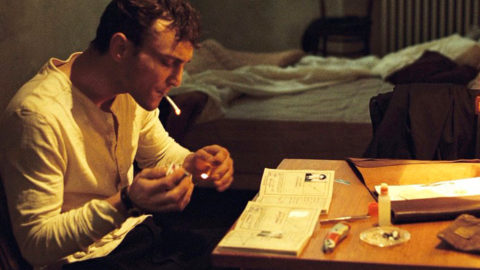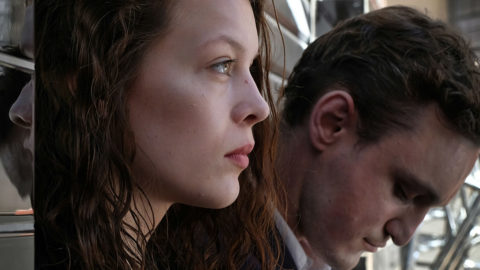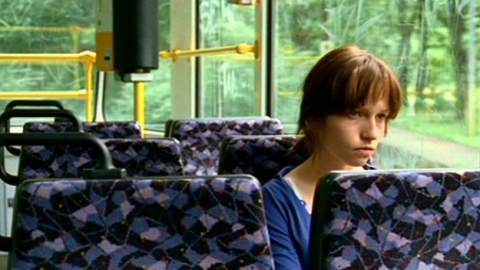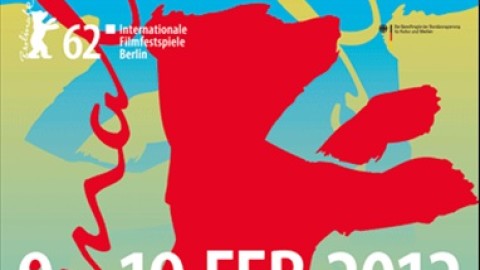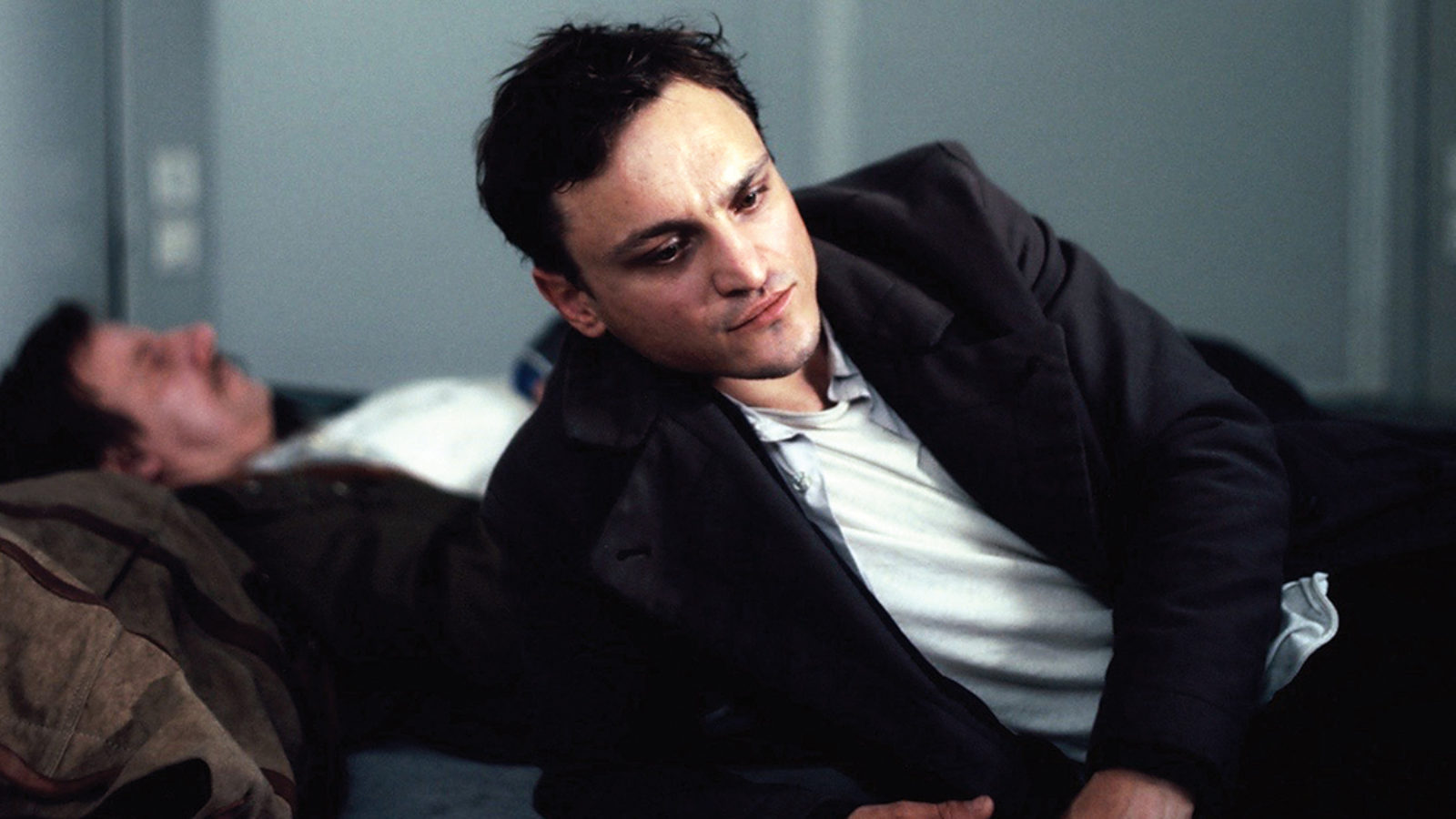
Neither Here Nor There
The title of Christian Petzold’s newest film packs a lot of meaning into two syllables. It refers to the papers sought by refugees desperate to escape from Nazi-occupied Europe—transit visas, which permit the holder to pass through a country provided they don’t stay. But the word “transit” starts a train of thought that passes through “transitional” and “transitory,” through ideas about in-betweenness and ambivalence that have run throughout the director’s work.
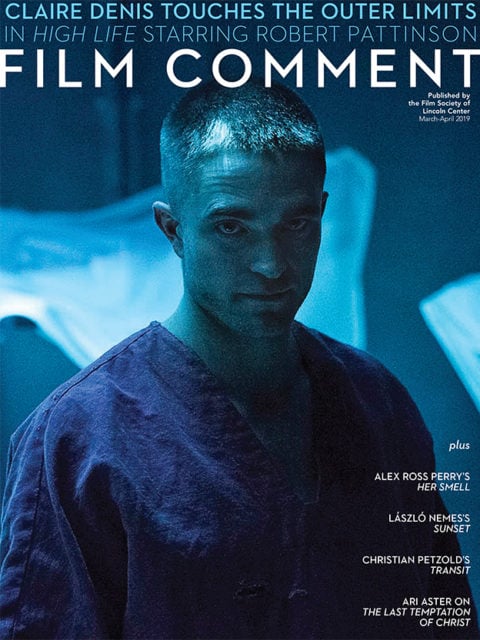
Since the mid-1990s, Petzold has fashioned a series of stripped-down yet fiercely engrossing dramas that marry the satisfactions of traditional narrative with a mood of dislocation and transience. His characters tend to be adrift in lives that are somehow provisional, restless yet becalmed, caught between escaping from the past and sinking in its nets. The family in The State I Am In (2000) is compelled to wander nomadically because of the parents’ long-ago crimes as left-wing radicals. The protagonist of Yella (2007) escapes from an abusive husband into a world of blandly generic hotels and chilly corporate meeting rooms, but is haunted by echoes and visions of her trauma. The heroine of Phoenix (2014), a Holocaust survivor, is a revenant, gradually and painfully trying to reconstruct her shattered face and identity. She is stranded not in space but in time, unable to move forward because the backward pull of the past is so strong. “Cinema loves phantoms,” the director has said. “Perhaps because it, too, is a space of transit, an interim realm in which we, the viewers, are concurrently absent and present.”
These themes appeared as early as Petzold’s film school graduation project, Pilots (1995), which opens with a map of Europe spread out on a café table. Two hands, a man’s and a woman’s, wander over the map, tracing routes, searching in vain for a place to meet. The film follows a pair of cosmetics saleswomen as they drive through a featureless nowhere-land of highways, hotels, shopping centers, parking garages, and vacant lots. This kind of landscape—for which anthropologist Marc Augé coined the term “non-places,” those sites where “people are always, and never, at home”—would become the setting for many of Petzold’s movies. Here the banal surroundings are ironically underscored by pop culture’s romanticism about travel: the women cruise down the autobahn to the strains of the Marvelettes’ “Destination Anywhere,” and to “Moon River,” with Sinatra crooning about “two drifters off to see the world.” The reality is far more prickly and interesting: the women are initially bitter rivals disgusted at being yoked together, until they bond over their sense of betrayal and powerlessness in a world run by men and money. They finally open up to one another while sitting in a weed-covered field, with jets roaring overhead. One asks: “What did you do before this job?” “Waited,” the other answers.
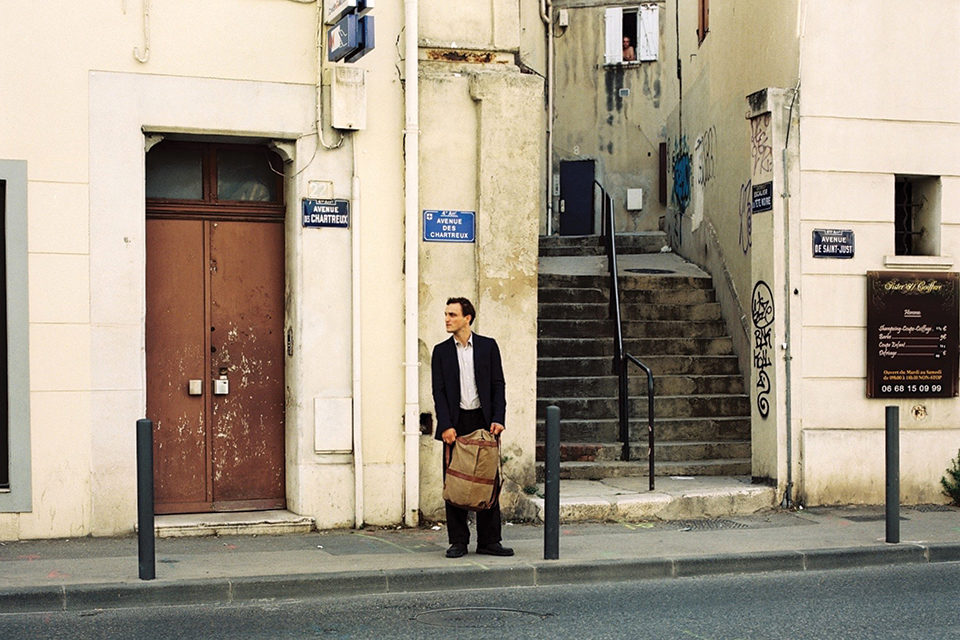
Transit includes a parable about a dead man waiting interminably to register in hell, only to learn that the endless waiting itself is hell. This speech comes directly from the film’s source, a 1944 novel of the same name by Anna Seghers, based on her own experience among the refugees in Marseille trying to flee from the advancing Nazis after the fall of France. (A Jewish communist, Seghers sailed with her family to Mexico in 1941; the book first appeared in English and Spanish translations, not published in her native Germany until 1948.) Narrated by a nameless German man who has escaped from concentration camps in his homeland and in France, and who flees first to Paris and then to Marseille, the novel is a dreamlike but precise evocation of the refugees’ existence: the boredom, the isolation and obsessive need to recount their stories, the repetitive cycle of fear and hope that becomes an emotional holding pattern. An indifferent and byzantine bureaucracy sends them scurrying like rats through a maze in pursuit of transit visas, exit visas, residency permits, ship’s passages. They spend their lives circulating through waiting rooms, cafés, and hotel rooms, caught in an absurdist nightmare in which petty details of correct stamps and forms govern whether they will live or die. They scramble to get aboard a boat, any boat, no matter where it is going. Destination anywhere.
It is easy to see why Petzold was drawn to this book, to which he was introduced by his mentor and collaborator, the late Harun Farocki. In a director’s statement accompanying the new film, he cites the concept of Geschichtsstille, or “history standing still,” a term drawn from Geheimnis und Gewalt (Secret and Violence), a memoir by the German communist, émigré, and wartime prisoner Georg K. Glaser—in whose honor, I presume, Petzold chose to name Transit’s protagonist Georg. “Historical silence is akin to windlessness or still air,” Petzold explains; “the breeze ceases to propel the sailboat, which is enveloped by the vast nothingness of the sea.” The feeling of paralysis in the midst of chaotic movement is familiar to everyone who has spent time waiting in airports, those dead spaces with their curious mixture of anxiety and numbness—an atmosphere that is perfectly captured in Transit.
The most interesting choice in Petzold’s adaptation of Transit is to reject entirely the trappings of a period film, without explicitly changing the historical context of the story. There are references to the Nazis and the Occupation, but the clothes, cars, and buildings we see are contemporary. At first this creates some disorientation and dissonance for the viewer, but these sensations quickly vanish. The settings have a carefully calibrated timelessness; if it is not the 1940s, it is not exactly 2019 either. There are no cell phones, no laptops, nothing that would clearly place the action in the present; clothing and decor suggest no particular location or time. The film thus elevates the story’s obvious parallels to the current flood of refugees on the shores of Europe without any specific references to or depictions of today’s African or Middle Eastern migrants. The condition of being a refugee, the film says, is universal.
Petzold’s treatment of the past has always been subtle and idiosyncratic. A number of his films have played with traditional genres (noir thrillers, melodramas) or alluded to Hollywood classics. Cuba Libre (1996), his second feature, takes Edgar G. Ulmer’s Detour (1945) as a road map; Jerichow (2008) is a reimagining of James M. Cain’s The Postman Always Rings Twice, with echoes of Luchino Visconti’s neorealist adaptation, Ossessione (1943); Phoenix (2014) combines elements of Vertigo (1958) with the rich tradition of plastic-surgery dramas such as George Cukor’s A Woman’s Face (1941) and John Frankenheimer’s Seconds (1966). But unlike some other directors who draw on studio-era Hollywood—Todd Haynes, for instance—Petzold never re-creates the look or style of earlier movies; there is no whiff of pastiche, irony, or nostalgia in his films, even the few that have period settings. What interests him seems to be the coexistence of past and present, the layers of time that are visible in urban settings, where buildings of different eras stand cheek by jowl, and audible whenever a car radio emits Sinatra. Petzold has spoken of his admiration for the Stolpersteine, or “stumbling stones”—cobblestones bearing small bronze plaques that have been installed in sidewalks around Europe to mark addresses from which victims of the Nazis were deported during the Holocaust. Conceived as an ongoing art project by Gunter Demnig, these memorials embed the past in the present in a mundane way but aim to be conceptual stumbling blocks, breaking people’s unconscious, complacent movement through contemporary spaces. In much the same way, Transit creates moments of vertigo with its collapsing of time and history.
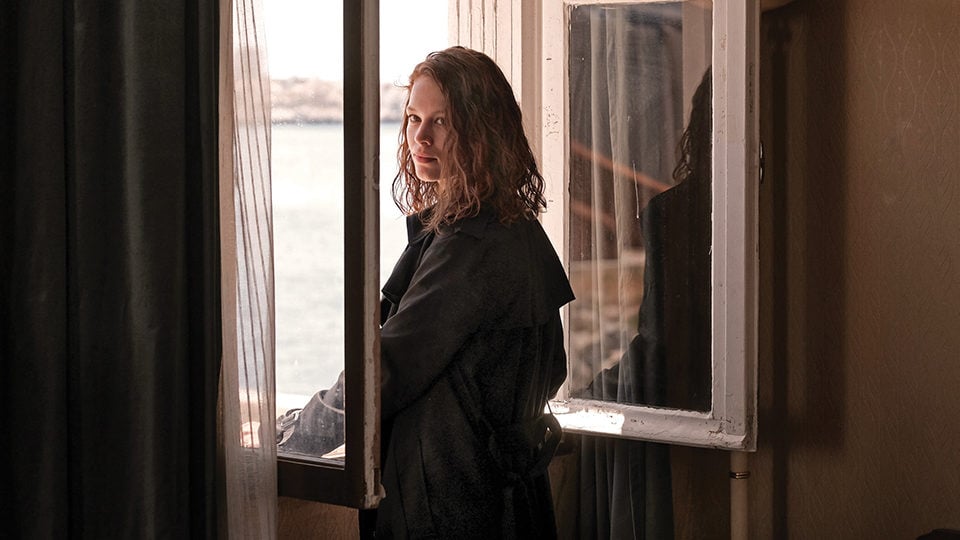
If Petzold’s films seem to stand slightly outside of time, it is also because of their somewhat anachronistic, and very welcome, commitment to storytelling. They seamlessly combine austere realism with the conventions and artifice of melodrama, their understated, unobtrusive visual style making the emotional structures stand out with hallucinatory clarity. His characters, precisely because they are in limbo, throw themselves into anything—crime, adulterous passion—that offers a clear direction and motive. Georg (Franz Rogowski), the protagonist of Transit, is a case in point. By chance he comes to possess the personal papers—including an unfinished manuscript and a precious Mexican visa—of a famous writer named Weidel, who has committed suicide. This leads to his assuming the writer’s identity, and to his encountering Weidel’s estranged wife, Marie (Paula Beer), and falling in love with her. At first he seems like a cipher, a piece of flotsam on the tide of history; but he reveals himself to be an opportunistic survivor who lies without compunction, as well as a romantic obsessive who pursues his ends with a quiet, termite-like persistence.
Rogowski plays Georg with a quiet watchfulness and hidden grace. His whole body seems to have absorbed the habits of a fugitive: being at once alert and inconspicuous, making do with little, and saying whatever the present occasion demands. His character is revealed in a few judicious strokes—he turns out to be a meticulous radio technician and an inspired soccer player, using the latter skill to bond with the lonely, fatherless child Driss (Lilien Batman). But his ordeal as a prisoner and refugee has stripped away much of his identity. He has no past, no home, no job, no friends, no family; his nation and his language have been tainted beyond recovery by the Nazis. This is what makes it so significant when something stirs his memories, for instance the German lullaby “Abendlied (Evening Song)” that he sings for Driss and his deaf North African mother, in which all of the animals—the codfish, the elephant, the butterfly, the fox, and the goose—return home at the end of the day. Only people have no homes. The movie does not retain the first-person narration of the book, but instead adopts a third-person narrator (Matthias Brandt), whom we eventually identify as a bartender at the pizzeria where Georg hangs out in Marseille, recounting in a detached yet sympathetic tone a story that was told to him. “Ports are places where stories are told. That’s what they are for,” he muses at one point. In the end, Georg gives Weidel’s manuscript to the nameless bartender, and the film seems to encourage a conflation of this unfinished story—by a dead man who remains a powerful presence, the protagonist’s doppelgänger and rival—and the story we are watching. We are also encouraged to question the accuracy of this story by deliberate disjunctions between the voiceover and the action on screen.
People tell stories because they want to be remembered, to fix identities that can so easily be erased, to combat historical silence. Twice in the film the question is asked: “Who is the first to forget, he who is left, or she who left him?” Marie’s answer is that those who are abandoned are luckier: “They have the sweet, sad songs. Pity is with them. People who leave, no one is with them.” Beer’s performance as Marie has qualities common to Petzold’s women—qualities his most frequent star Nina Hoss brings to Barbara (2012) and Jerichow, and that unite many actresses in his films, from Eleonore Weisgerber in Pilots to Nina Kunzendorf in Phoenix and Barbara Auer in Transit. There is a certain containment and aloofness that marks the way they move and carry themselves; a challenging, unsmiling demeanor; a complex inner life that simmers under the surface and emerges in bold, impulsive actions. Less fully developed than these other female characters, Marie seems at times like a glamorous phantom dreamed up by lonely men, flitting in and out in her black trench coat, red lipstick, and high heels. But she is a troubled and troubling figure, vacillating between three men, between staying and sailing. After leaving her husband, she searches for him obsessively, both because he has her visa and because of her guilt and need for some kind of reconciliation. She takes up with a doctor who delays his own escape to wait for her, but she seems attached to him more by gratitude and loyalty than passion. She appears to be in love with Georg, but keeps unsettling him with her talk about her husband, whom he knows to be dead.
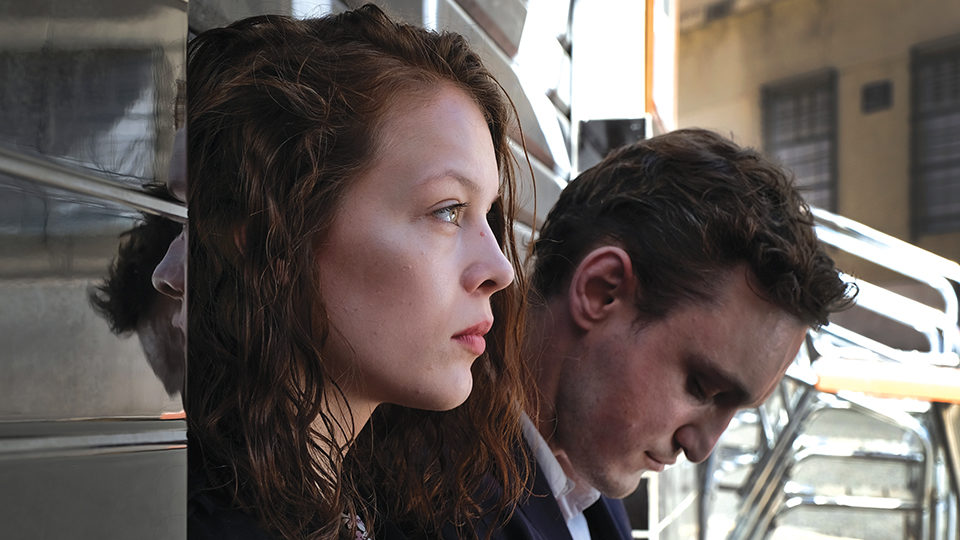
Transit is the final film in a trilogy Petzold has dubbed “Love in the Times of Oppressive Systems.” The insight of these works—set during the Cold War (Barbara), the immediate aftermath of World War II (Phoenix), and the Occupation (Transit)—is that living under even the most evil governments does not make for simple choices, nor moral or emotional clarity for the oppressed individual. Exiled to the provinces as punishment for applying to leave the country, the eponymous doctor (Hoss) in Barbara yearns and schemes to escape East Germany, but the alternative to the degrading surveillance and deprivation of the East is a shallow, materialistic, and irresponsible West, and the abandonment of people for whom she has come to care. Nelly (Hoss again) in Phoenix is so destroyed by her experience in Auschwitz that she obsessively seeks to return to her prewar past, even at the cost of living a humiliating lie and forgiving betrayal. As for Marie, her indecision and tangled loyalties are like an internal version of the convoluted bureaucracy that seems dedicated at once to getting rid of the refugees and making it impossible for them to leave.
From its opening moments, Transit evokes a vague but omnipresent sense of dread—sirens in the streets, police in black riot gear, raids and the fear of raids—and the effect this dread has on crowds and on relationships. Among the desperate supplicants filling consulate waiting rooms, Georg meets a conductor trying to get to Venezuela, who dies of a heart attack after being rejected for a visa because he has one fewer than the required number of passport photos. Georg also encounters a Jewish woman whose escape is contingent on her acting as chaperone to the two beloved dogs of a wealthy American couple. This poised, acerbic woman (Auer) has a presence more striking and weighted than her character seems to merit, which pays off in one of the most deftly powerful scenes, not drawn from the book. Late in the film, she invites Georg to dinner, and afterward they stroll through the calm evening light, as she talks about the architecture of a particular bridge in Marseille that connects part of the old city with a newer area (a perfect, if on-the-nose, metaphor for the film’s bridging of past and present). She asks for a cigarette, and when he turns around she has noiselessly vanished, slipping over the parapet to her death. We do not need to be told why. This is a world in which people just disappear, where they can be snuffed out or flicked away like cigarettes. But the hints of mystery, even of magic, that run through the story—from Georg’s assumption of the dead man’s identity to the first fleeting appearances of Marie; from the mending of a radio with a tiny bit of metal melted over a candle flame, to the fragment of a childhood song that emerges when it is turned on—suggest the possibility that people might also reappear, a persistent hope that haunts the final, ambiguous scene.
The Marseille of the film is a space of transit, an interim realm, but it is also a solid and ordinary place. Poppies grow along the railroad tracks where Georg jumps off a train, leaving behind a dead companion. The sun shines on the harbor, on steps and plazas and archways and dusty lawns in housing projects. Honeyed light floods anonymous hotel rooms. People sit in pizzerias and outside ice cream shops and in the waiting rooms of consulates and against graffiti-covered walls. They talk about one thing only: passages, departures. In the novel, Seghers writes:
It was the age-old harbor gossip, as ancient as the Old Port itself and even older. Wonderful, ancient harbor twaddle that’s existed as long as there’s been a Mediterranean Sea, Phoenician chit-chat, Cretan and Greek gossip, and that of the Romans . . . The remnants of crushed armies, escaped slaves, human hordes who had been chased from all the countries of the earth, and having at last reached the sea, boarded ships in order to discover new lands from which they would again be driven; forever running from one death toward another. Ships must always have been anchored here, at this very place, because this is where Europe ends and the sea begins.
In the last few years, the Mediterranean has again become a scene of flight, of desperate people boarding boats—now rubber dinghies rather than liners or freighters, now fleeing to Europe rather than away from it, but living the same nightmare that Seghers captured in 1944, as they navigate bureaucracies that will decide their fate, and as they face the merciless reality of being unwanted everywhere. The plight of refugees, migrants, and exiles may be, for the foreseeable future, the central story of our times. (A scene in which a woman is dragged away by the police in the middle of the night as her children scream and fellow hotel guests look on in mute shame now resonates inescapably with family separations along the U.S.-Mexico border, a story that had not yet broken when the film was made.)
The ending of Transit deliberately withholds resolution, a gimmick so popular in art-house cinema that it has become a cliché. But here perhaps it is legitimate, leaving the film’s irresolute tone, its theme of eternal waiting, to hang in the air like smoke. “Everyone was fleeing and everything was temporary,” Seghers writes. “We had no idea whether this situation would last till tomorrow, another couple of weeks, years, or our entire lives.”
Imogen Sara Smith is the author of In Lonely Places: Film Noir Beyond the City and Buster Keaton: The Persistence of Comedy, and has written for The Criterion Collection and elsewhere. Phantom Light is her regular column for Film Comment.



